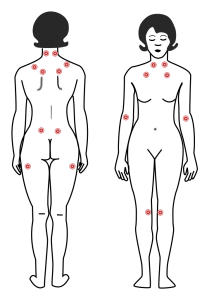The worst part about having fibromyalgia is the fact that you suffer from severe muscle pain all over your body — most notably in these 18 tender points.
It’s a mysterious condition that affects millions of people throughout the world. Its exact cause is difficult to determine.
Fibromyalgia is a common syndrome in which a person has long-term pain, spread throughout the body. The pain is most often linked to fatigue, sleep problems, headaches, depression, and anxiety. People with fibromalgia may also have tenderness in the joints, muscles, tendons, and other soft tissues. Source
However, even if you have severe muscle pain throughout your body, it cannot be assumed that you have fibromyalgia.
In fact, it’s quite common to be misdiagnosed as having fibromyalgia when you don’t — because there are several other health conditions with symptoms that are very similar to fibromyalgia symptoms.
Rae Marie Gleason, executive director of the National Fibromyalgia Association, said the tendency still exists among physicians to view fibromyalgia as “an illness of whining women who really could get better if they just wanted to.” Yet, Gleason’s job gets easier every day, as an abundance of research ties those patients’ complaints to brain activity – or lack thereof. Source
If you feel that you might have a chronic pain disease like fibromyalgia, your doctor can administer a series of fibromyalgia tests in order to rule out other illnesses and ultimately determine if fibromyalgia is the true cause for your pain.
In the meantime, it’s worth exploring these 5 other health conditions can easily be mistaken for fibromyalgia:
#1 – Rheumatoid Arthritis
A chronic disease that affects about 2 million people in the United States, rheumatoid arthritis can lead to inflammation of the joints, tissues and possibly other organs — if not treated.
People with rheumatoid arthritis share the same symptoms as those with fibromyalgia — like muscle fatigue and pain. However, rheumatoid arthritis patients also have problems with the tissues that connect bones and muscles. Such is not the case for those who have fibromyalgia.
To add another layer to the challenge of finding the right diagnosis, it’s also possible that if you’re suffering with these symptoms you may have both fibromyalgia and rheumatoid arthritis.
Only a doctor can tell for sure.
#2 – Osteoarthritis
Osteoarthritis is one of the most common types of arthritis where cartilage in the joints slowly deteriorates. As with fibromyalgia, you may suffer severe muscle aches and muscle stiffness.
Osteoarthritis may also affect the range of motion of your joints as well. The degeneration of joint tissue happens when you have osteoarthritis, but it does not occur when you have fibromyalgia.
A doctor can determine the difference through an examination and review of your x-rays.
#3 – Hypothyroidism
Hypothyroidism is a condition where your thyroid gland is not able to produce a sufficient amount of the thyroid hormone.
This leads to fatigue, body aches and pains, as well as poor sleeping habits.
The same lab tests that are used to determine if you have hypothyroidism will quickly rule out fibromyalgia.
Your doctor will run a series of blood exams — like a CBC test — as soon as you first notice symptoms.
#4 – Myositis
Myositis is inflammation of the muscles.
There are a variety of diseases that fall under myositis and they do have similar symptoms as fibromyalgia. However, myositis involves pain and fatigue that are specific to the muscles, while fibromyalgia typically involves pain throughout the entire body.
If you have a high muscle enzyme count, that’s a good indication that you may be suffering from myositis.
A high muscle enzyme count does not normally occur for people with fibromyalgia.
#5 – Neurological Disorders
There are a wide range of neurological disorders with symptoms that are very similar to fibromyalgia symptoms.
Since they are so varied, your doctor will probably do a series of neurological exams in order to give you a proper diagnosis.
If you do not appear to have some other neurological disorder, then fibromyalgia may be the diagnosis.
Fibromyalgia (FM or FMS) is characterized by chronic widespread pain and a heightened and painful response to pressure. Fibromyalgia symptoms are not restricted to pain, leading to the use of the alternative term fibromyalgia syndrome for the condition. Other symptoms include debilitating fatigue, sleep disturbance, and joint stiffness. Some people also report difficulty with swallowing, bowel and bladder abnormalities,numbness and tingling, and cognitive dysfunction. Fibromyalgia is frequently associated with psychiatric conditions such as depression and anxiety and stress-related disorders such as post-traumatic stress disorder. Not all people with fibromyalgia experience all associated symptoms. Source
As you can see, trying to determine if you have fibromyalgia or some other illness can be a challenge.
These are just 5 common health conditions with symptoms that are very similar to fibromyalgia symptoms.
Believe it or not, there are even more illnesses with symptoms similar to fibromyalgia. Each of these must be ruled out before you can be treated for fibromyalgia.
That’s why it’s so important that you consult with a doctor before you try any treatment on your own. If you don’t, you may suffer more serious consequences in the long run.






